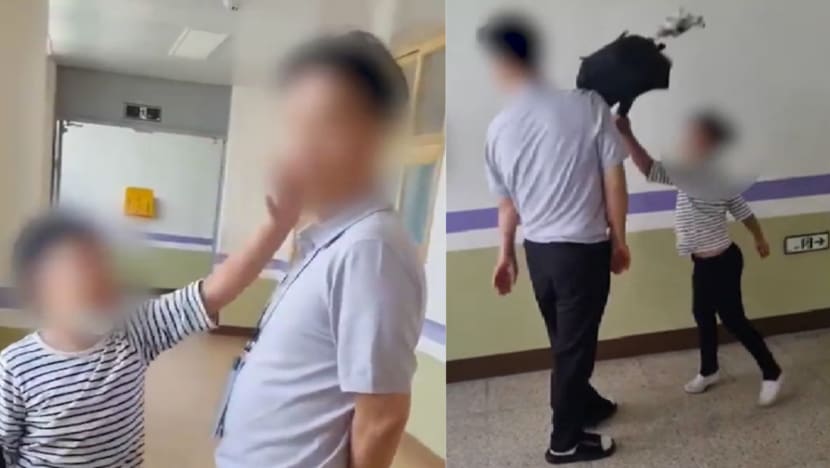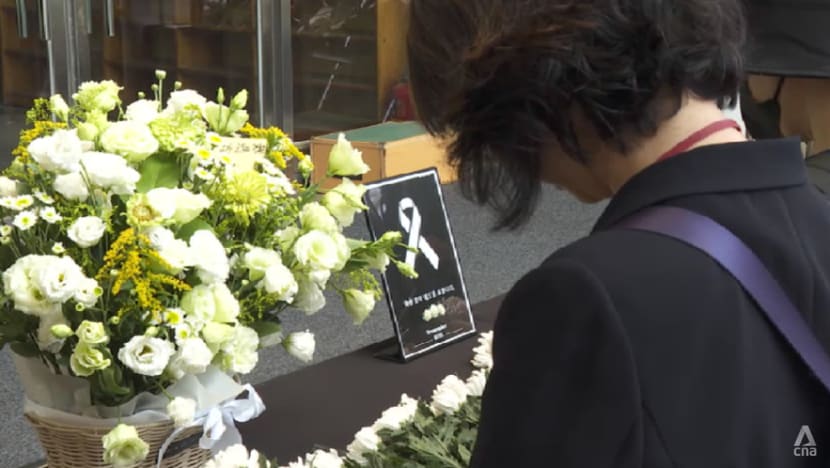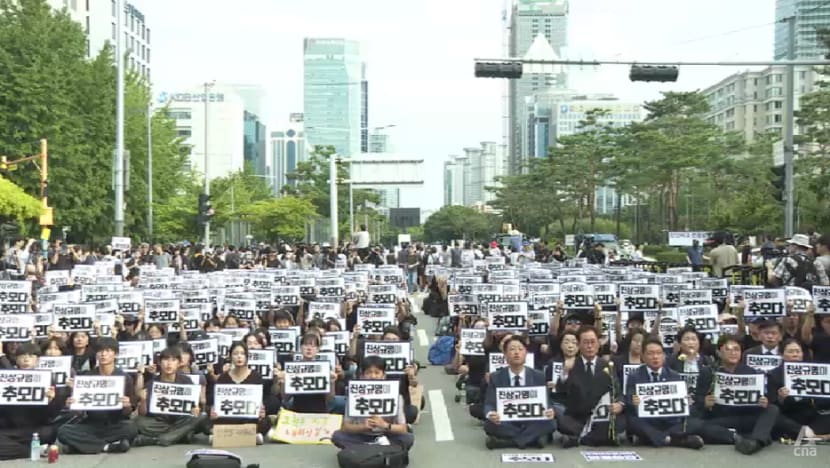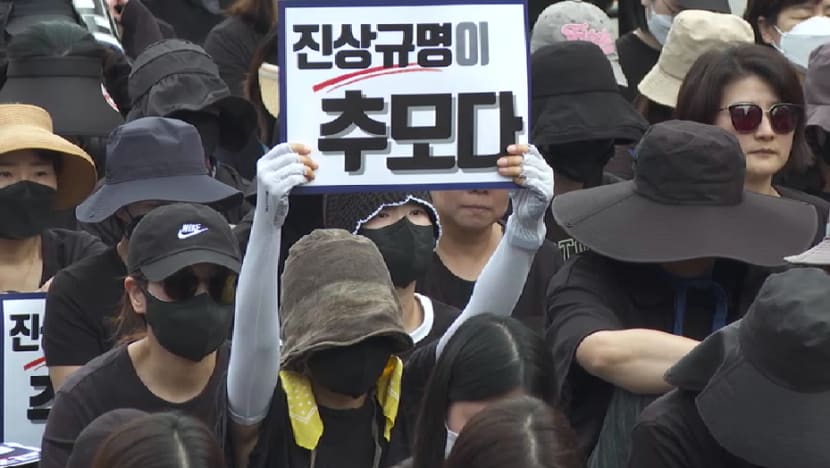‘Fear of facing students’: South Korea teachers grapple with high rates of abuse and suicide
Cases of teacher abuse often go unreported due to reasons like fear of retaliation, lack of support, and cultural norms that discourage them from speaking out.

In a video that has gone viral, third-grade schoolboy slaps his vice principal and swings his backpack at him, when the educator tried to stop the boy from leaving school without permission, in Jeonju, South Korea. (Footage: Jeonbuk Teachers' Union)

This audio is generated by an AI tool.
SEOUL: A video of a student slapping a vice-principal at a South Korean elementary school went viral last month.
A third-grade student had assaulted and verbally abused the vice-principal when he tried to stop the boy from leaving school without permission.
In the footage released by the Jeonbuk Teachers' Union, the schoolboy slapped the man several times, swung his backpack at him, and spewed profanities.
Local media reported the student also bit and spat at the vice-principal. Despite the intervention, the boy eventually succeeded in leaving the schoolground.
The vice-principal did not try to defend himself, at times standing passively with his hands behind his back while he was hit.
Educators said his reaction was not uncommon – teachers often feel unable to protect themselves as they fear being accused of child abuse and dragged through the courts.
“He has his hands behind his back while he is being slapped. Some people might say, ‘Why is that? He should grab the child's hands and try to stop him’. Such statements show a lack of understanding of the reality,” said Kim Dong-seok, the director of teachers’ rights at the Korean Federation of Teachers’ Associations.
“What if the vice principal held the child's hands and left a mark? Naturally, it would be reported as child abuse.”
Local media also reported the boy’s mother later went to the school, located in the western city of Jeonju, and assaulted the homeroom teacher.
Kim said educators in South Korea often suffer abuse by students and parents in silence.
Most cases go unreported due to reasons like fear of retaliation, lack of support, and cultural norms that discourage them from speaking out.
"Students behave very disrespectfully – they slam doors or make obscene gestures. If teachers reported every such incident, there would be many cases,” he added.
“Often, teachers endure these situations, pretend not to notice or overlook them.”
Incidents like last month’s have in recent years thrown the protection of schoolteachers and their mental health into the spotlight.
PROTESTS OVER TEACHER’S SUICIDE
Last July, a first-grade teacher took her own life in the school she taught at, located in Seoul’s high society neighbourhood of Gangnam.
Hundreds of her diary entries and text messages showed months of harassment from parents at Seoi Elementary School.
The 26-year-old died after teaching for just a year. She is among a high number of teacher suicides – mostly elementary school educators – in the nation.
According to government data, about 100 public school teachers took their own lives between January 2018 and June 2023.
Her death sparked nine weeks of rallies by tens of thousands of educators nationwide, calling for measures to safeguard teachers' rights.

THE TEACHER RIGHTS RESTORATION BILL
In September, authorities made key changes to provide teachers with more protection and better working conditions.
Under new legislation, educators are no longer automatically suspended if they are accused of child abuse, pending further investigation and evidence.
Teachers are now allowed to remove disruptive students from classrooms.
Elementary schools will record phone calls from parents, while teacher-parent meeting rooms will be fitted with video monitoring systems.
Complaints and lawsuits by parents are also no longer the responsibility of teachers, but the principal’s. Those fighting lawsuits will be able to seek financial support.
Parents are not given teachers’ personal data as well, like their mobile phone numbers.

After the new legislation kicked in, the number of complaints fell drastically.
Between September 2023 and April this year, 385 cases of child abuse were filed by parents against teachers – much lower than the 1,702 cases in 2022, and 1,229 in 2021.
CONDITIONS REMAIN TOUGH
While the Korean Federation of Teachers’ Union has welcomed the new regulations, some teachers said there has not been much improvement.
A recent poll showed that 78 per cent of 11,359 teachers surveyed did not think conditions have changed significantly.
“In handling complaints, the process sometimes doesn't proceed properly due to a lack of personnel in schools. Therefore, it is still somewhat difficult to feel any significant improvement in effectiveness,” said an elementary school teacher, who was once sued by a parent.
The 30-year-old educator did not want to be identified, as he continues to be scarred by the experience from a few years ago.
He was brought to court by a mother who accused him of emotional abuse, after he scolded her child for using foul language and disrupting the class.
He won the case, but it left him with post-traumatic stress disorder.
“The fear of facing students and parents grew significantly. During the process of being investigated by the police, I felt a deep sense of frustration, as if all my efforts as a teacher were being completely negated,” he said.
He added he found solace and comfort from discussing shared experiences and getting support from fellow teachers.

PROBLEMS EXPECTED TO PERSIST
Last April, a survey by the teachers’ union found that 26.5 per cent of teachers had received counselling or treatment for job-related psychological issues, while a whopping 87 per cent have considered quitting.
Experts suggested that the depth of the issue is partly caused by certain societal values in South Korea.
"There is a unique aspect of Korean society, which could be described as intense family-centric, or family self-interest attitudes,” explained social welfare professor Jung Jae-hoon from Seoul Women’s University.
“Parents invest heavily in their children and cannot tolerate the feeling that their child has been wronged. This distorted sense of parental privilege, combined with the high value placed on their child's education, leads to teachers' rights violations."
Observers are doubtful the issue would be resolved anytime soon, pointing to South Korea’s fertility rate – the world’s lowest – which means parents are likely to remain overprotective of their children.
“Nowadays, people have fewer children and so each child is incredibly precious to them. As a result, parents contact the schools more frequently, even for small issues,” said Song Ji-ae, a mother of two children.
Still, teachers CNA spoke to acknowledged that public awareness has grown about the harsh conditions that teachers face.
Mental health professionals have called for more support for South Korean educators, including efforts to reduce stigma and encourage help seeking.
“It’s difficult when a teacher is worried about what happens if they come forward,” said Yvette Lau, a mental health counsellor and former teacher based in Hong Kong.
“School leaders can (help) by encouraging communication, understanding the issues and challenges that teachers struggle with, and creating a culture of communication and support.”

















